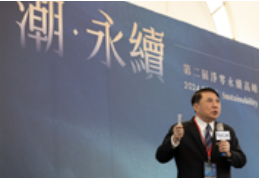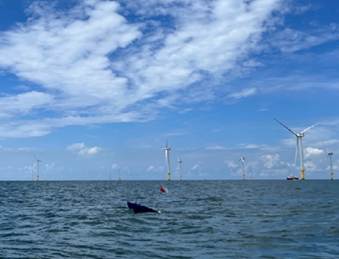7.4.4
- NTOU Responds to the 2nd Net-Zero Sustainability Summit to Move Towards the 2050 Net-Zero Emission Goal 海大響應第二屆淨零永續高峰論壇共同邁向 2050淨零碳排目標
National Taiwan Ocean University (NTOU) responded to the "2nd Net-Zero Sustainability Summit," where President Hsu Tai-Wen delivered a speech on "2050 Net Zero Carbon Emissions and Marine Energy Policy". NTOU showcased technologies related to sustainable marine energy, cultivated blue carbon circulation, and marine resource recycling.
Sustainable Impact: Actively responds to global sustainable development trends by gathering elites to discuss how to promote Taiwan towards sustainable development. Showcasing marine energy technology supports the ambitious goal of net-zero emissions, and promotes clean energy policy and technology.
國立臺灣海洋大學響應「第二屆淨零永續高峰論壇」,許泰文校長以「2050淨零碳排與海洋能源政策」為題發表演講。海大於現場展示有關永續海洋能源、養殖藍碳循環及海洋資源循環利用的相關技術。
永續影響力: 積極回應全球永續發展趨勢,匯聚各界菁英共同探討如何推動台灣邁向永續發

Evidence: https://usrsdg.ntou.edu.tw/var/file/103/1103/img/1514/599406774.pdf
2. Developing USV-based Ocean Acoustic Tomography and Charging Navigation System for Enhanced Offshore Wind Turbine Foundation Safety 發展無人船海洋聲層析與充電導航系統以提升離岸風機基礎安全
This project aims to develop an integrated system combining Unmanned Surface Vessels (USVs), ocean acoustic tomography technology, and wireless charging/autonomous navigation to monitor and provide early warnings for seabed scouring risks to offshore wind turbine foundations.
Sustainable Impact: This technology can provide early warning for offshore wind turbine foundation scouring risks, enhancing the safety of energy infrastructure, while promoting the development of smart vessels and green energy technology.
本計畫旨在研發結合無人船(USV)、海洋聲層析技術及無線充電/自主導航系統,用於監測與預警離岸風電基礎的海床淘刷風險。
永續影響力: 本技術可用於預警離岸風機基礎淘刷風險,增進能源設施安全,同時促進智慧船舶與綠能科技發展。

Evidence: https://usrsdg.ntou.edu.tw/var/file/103/1103/img/1514/599406774.pdf